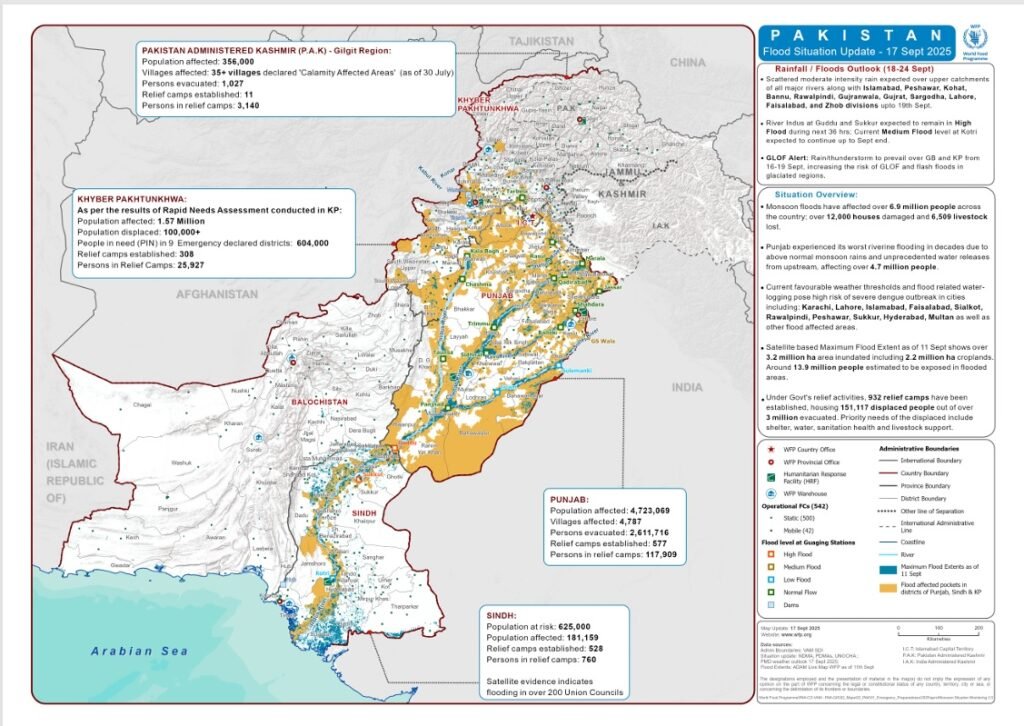The Learning Republic
Home > The Learning Republic
Higher Education in Pakistan - From Preparedness to Recovery: Academic Pathways to Reducing the Impact of Floods in Pakistan




Natural disasters like floods, earthquakes, landslides, and droughts happen a lot more often and are much worse because of climate change, bad infrastructure, and bad planning for towns and cities. Floods are very damaging, especially in places like Pakistan, where monsoon rains have caused huge amounts of damage to lives, property, and jobs. To fight these disasters, we need a plan that includes education, being ready, early warning systems, and strong healthcare and management systems. In this research, we examine how many academic and professional fields, specifically Nutrition, Allied Health, Management Science, Psychology, and Nursing, might mitigate the effects of floods and natural disasters.

Source: World Food Programme. (2025, September 17). Pakistan: Flood 2025 situation update – 17 September [Map]. ReliefWeb. https://reliefweb.int/map/pakistan/wfp-pakistan-flood-2025-situation-update-17-september

Chief Minister Punjab with Flood-Affected People. Providing them with Freelancing Opportunities can alleviate their sufferings
Nutrition
Nutrition is a critical concern in the aftermath of floods and other disasters. The displaced people, especially the children and pregnant women, are very hungry and malnourished because the supply systems are broken and the food and water are dirty. When it comes to disaster recovery and response, professionals in nutrition and food sciences with higher education are particularly important. They help organize emergency food programs, figure out what food needs to be assessed, and make sure that relief camps have safe, high-energy meals. Nutritionists also teach local volunteers and humanitarian workers how to handle food, where to keep it, and how much they should eat during times of disaster.
Nutritionists can aid with long-term catastrophe preparation by making food systems, food storage, and agricultural recovery more robust. Because they are involved, the communities who were hurt will be able to heal without any long-term effects of bad nutrition and hunger.
Allied Health
During and after a natural disaster, paramedics, lab technicians, radiographers, and physiotherapists will all be needed. Floods can spread diseases through water, hurt people, and trigger outbreaks of cholera, hepatitis, and typhoid.
Allied health professionals with more knowledge and training can help find infections, treat injuries, and give emergency medical care in areas that have been hit by disasters. These specialists who work in mobile health units can get to people quickly in remote places. They also keep an eye on diseases, assess the environment (such the quality of the water), and teach people in the community about health.
Higher education in allied health can improve a country’s ability to deal with disasters by increasing the number of skilled responders who can act quickly and effectively in an emergency.
The Need for Psychology
Natural disasters can inflict psychological damage to people and society. The loss of loved ones, houses, and jobs can induce trauma, anxiety, despair, and post-traumatic stress disorder (PTSD).
Psychologists and mental health professionals are vital in providing emotional support during and after disasters. People who have a higher degree in clinical or counseling psychology are trained to give trauma-informed care, psychological first aid, and community-based intervention. They help kids, adults, and families deal with loss and fear so they can get better both emotionally and socially.
Psychologists also help prepare for disasters by educating disaster personnel, making educational materials about disasters, and raising awareness of mental health issues during calamities. Psychology makes sure that both mental and physical health are taken care of.
Management Sciences
Management science is essential for catastrophe risk mitigation and emergency response. Disaster management and operations cover all the planning, resource allocation, logistical coordination, and leadership that are needed for different kinds of natural disasters. People that know a lot about management science, logistics, and project management can make good plans for evacuations, distribute resources, and run large-scale evacuations. They work with the government, NGOs, and other international organizations to plan disaster response, keep track of progress, and measure the effects.
In the long run, experts in management science can help build infrastructure that can withstand disasters, identify risks, and come up with plans for recovering from them that make us less vulnerable in the future. Their ability to handle crises and make decisions is very important for altering their reaction from reactive to proactive.
Nursing
Nurses are the first people to respond to a disaster. Nurses can do a lot of different things in a disaster response team, from giving first assistance to treating chronic diseases in relief camps.
Through more knowledge and training in disaster nursing or emergency care, nurses can take on more important responsibilities in triage, provide life-saving care, and keep infections from spreading in crisis situations. Their skills are especially useful in areas that are prone to flooding, where there aren’t many health care facilities and disease epidemics are likely to happen.
Nurses also make sure that vulnerable groups of individuals, like the elderly, pregnant women, and patients with non-communicable diseases, don’t fall through the cracks when things become tough. They also play a big role in teaching people about health, immunization campaigns, and cleanliness during the recovery from a disaster.
Final Thoughts
It takes strategy, education, and skilled workers to tackle floods and other natural disasters. People who have a higher education in areas like nutrition, allied health, management science, psychology, and nursing are better able to play important roles before, during, and after disasters.
In places like Pakistan, where floods happen often, having a system that can withstand them lets you create infrastructure and invest in people at the same time. Schools and universities should teach students how to prepare for and respond to disasters. Governments and non-governmental organizations should also give educated professionals the chance to volunteer to help with disaster management on a national level.
Only a coordinated, well-planned, and well-educated response can save lives, rebuild communities, and be long-lasting in the face of more and more climate-related calamities.
Authors
Mr. Farhan S. Sherazi is Head of NUR Centre for Research and Policy and Director – Professional Development at NUR International University / Fatima Memorial College of Medicine & Dentistry / Saida Waheed College of Nursing
Ms. Maya Younis is Program Lead at NUR Centre for Research & Policy